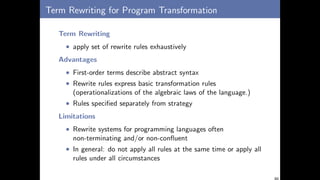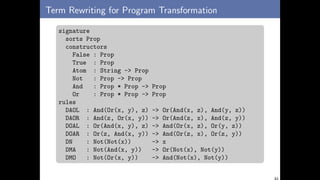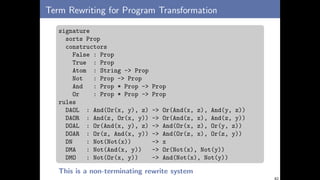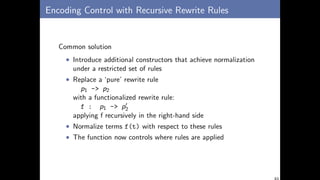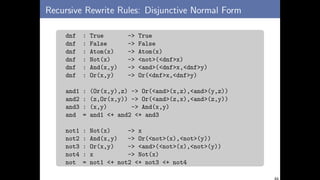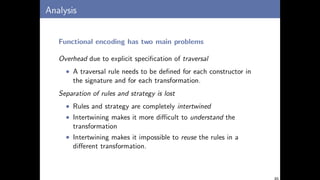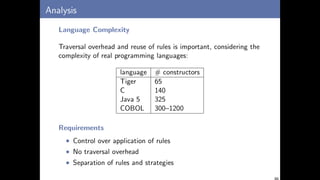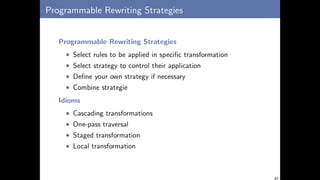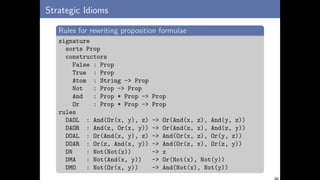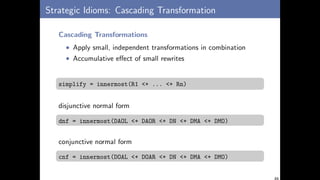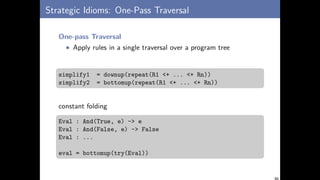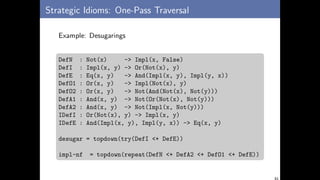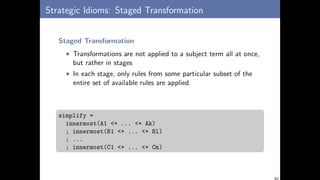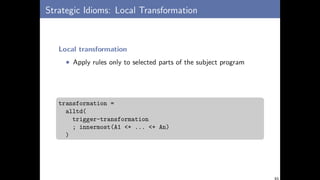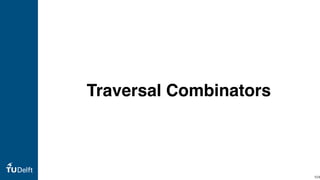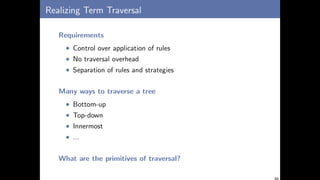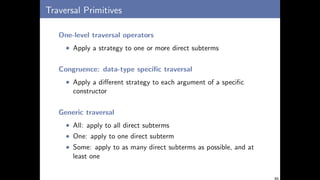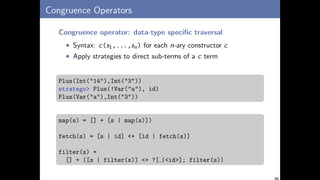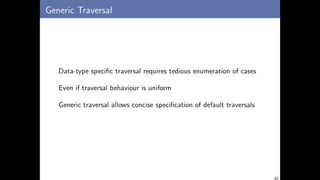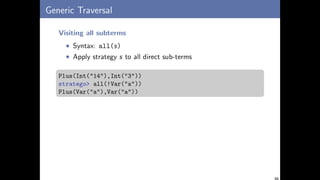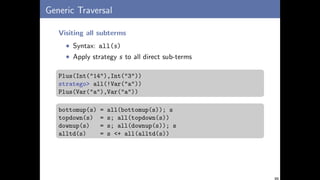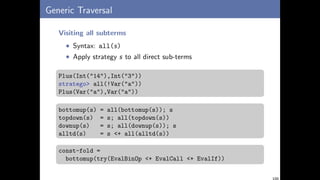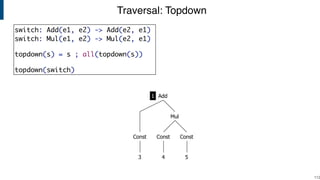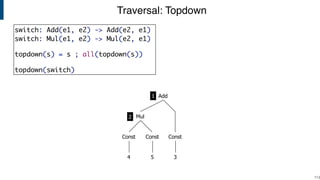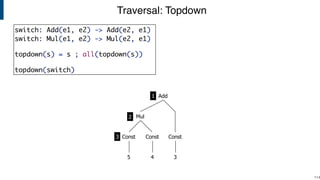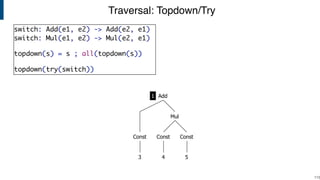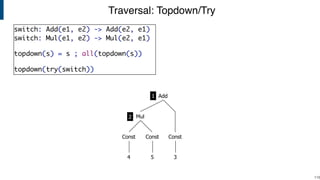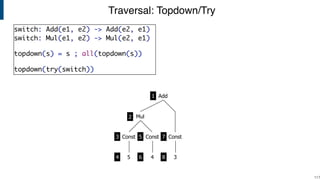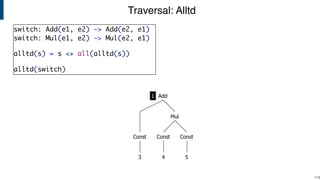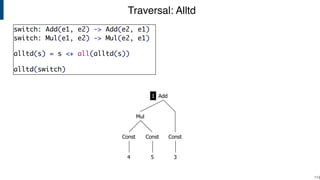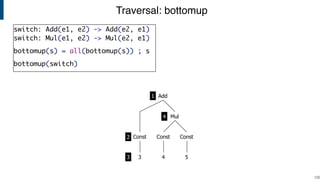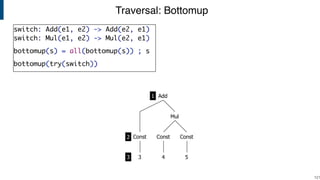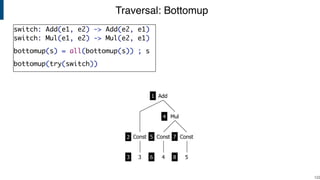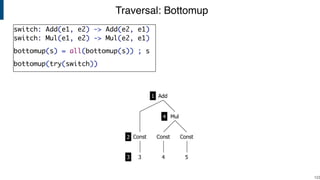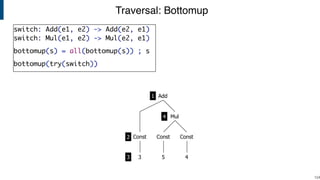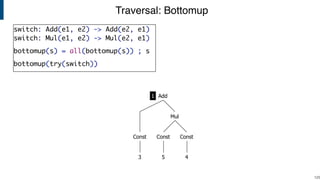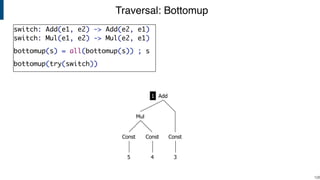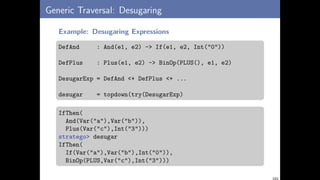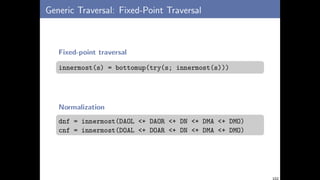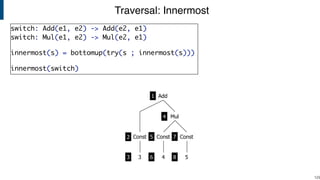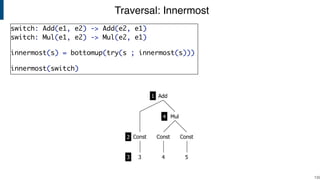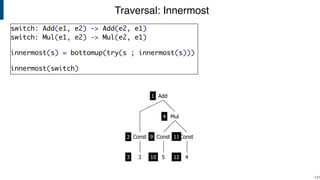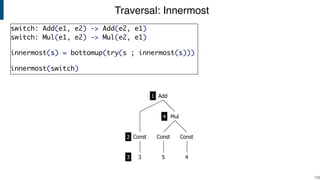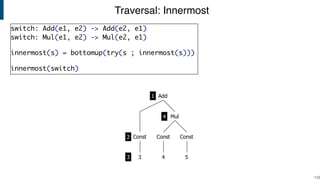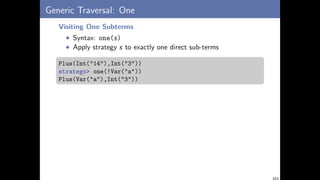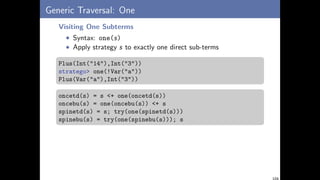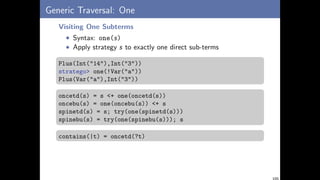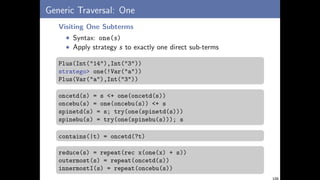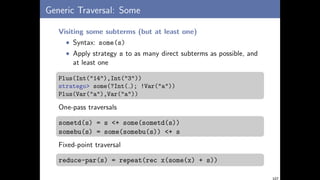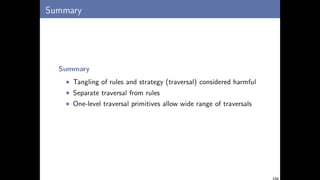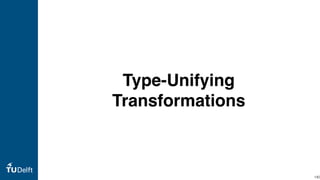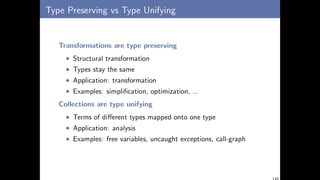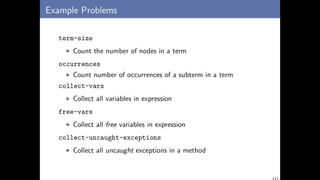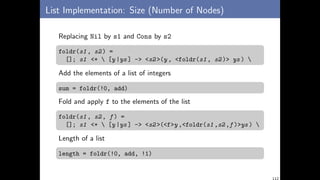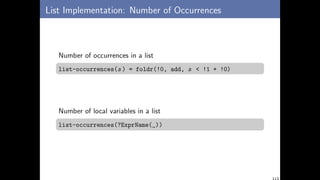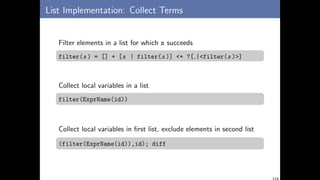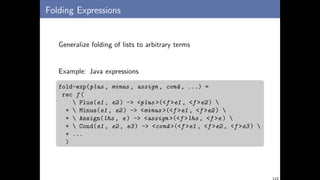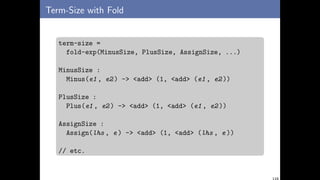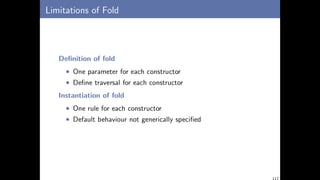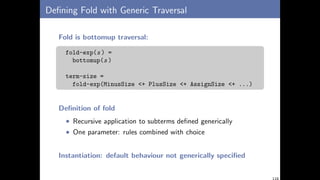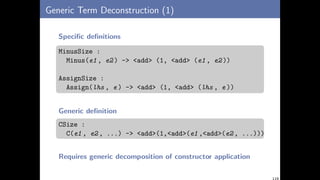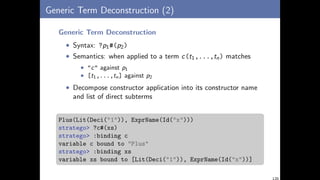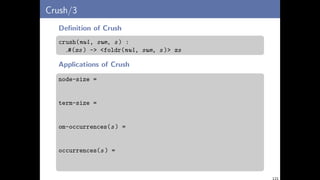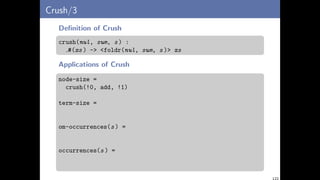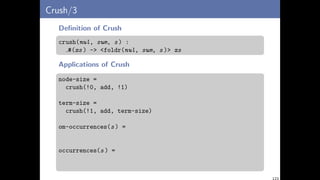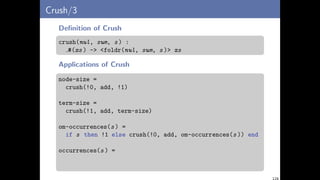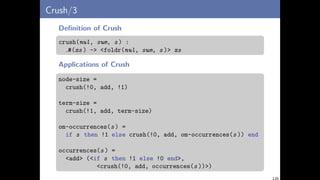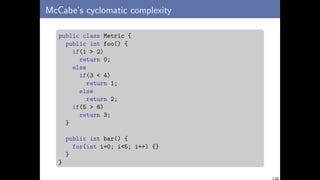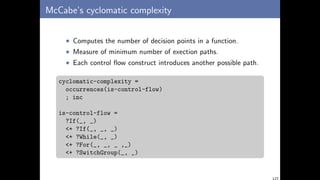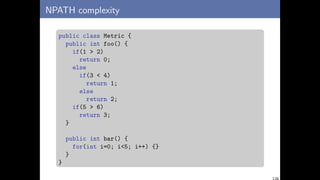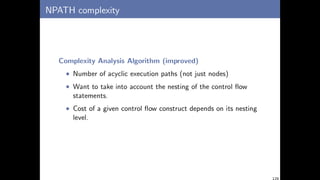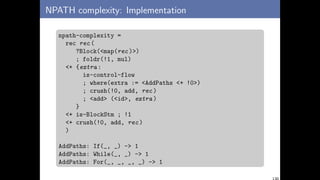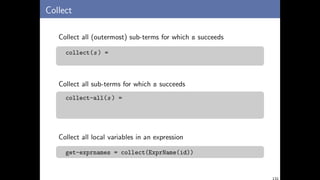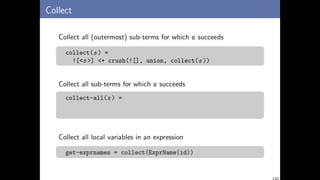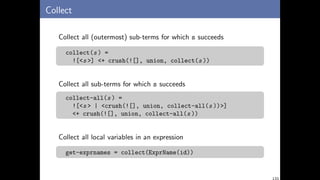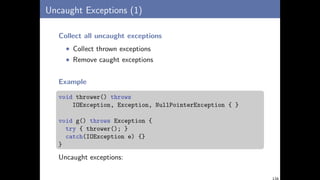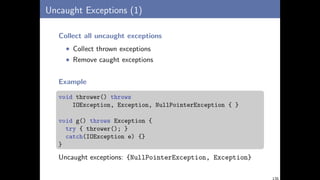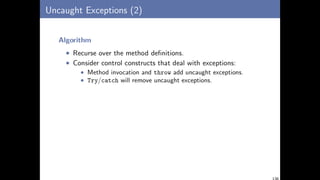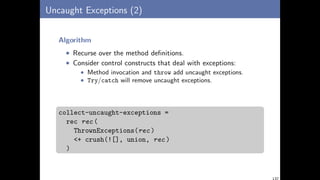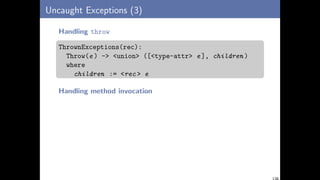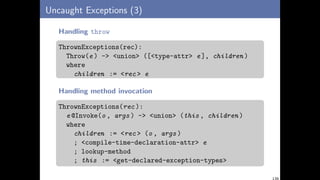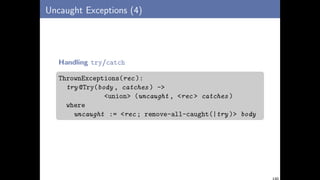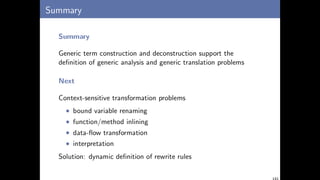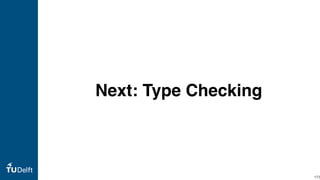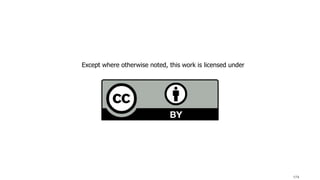This document outlines Lecture 5 on term rewriting within the CS4200 Compiler Construction course at TU Delft, highlighting transformations of abstract syntax trees using rewrite rules, and discusses Spoofax as a language workbench for language definitions. Key components covered include programmable rewriting strategies, specific syntax and desugaring techniques, as well as integration with Eclipse and the use of Stratego for program transformation. Additionally, it touches upon practical applications such as debugging and outlining within the Spoofax environment.
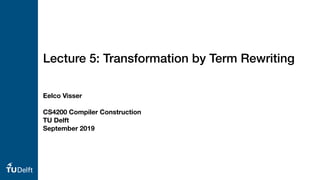
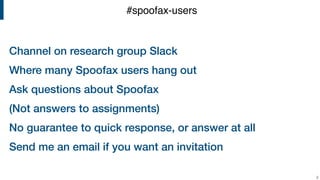
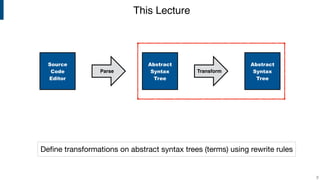

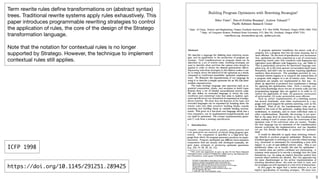
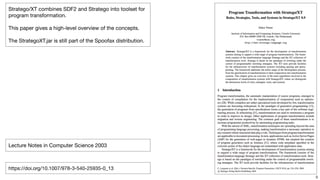
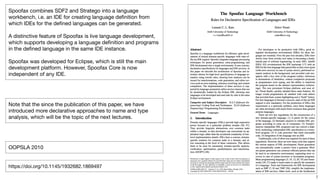

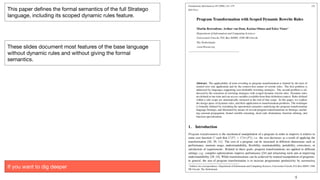
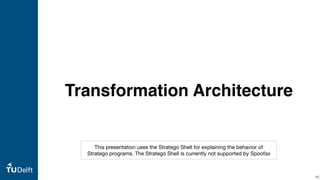
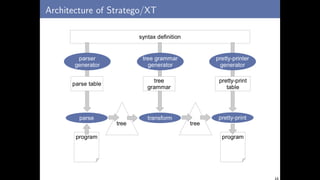
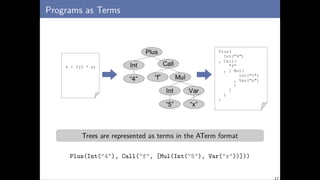
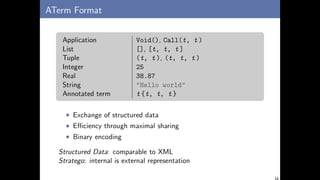
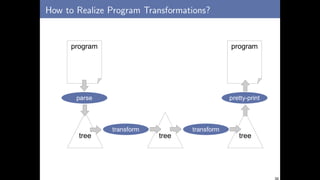
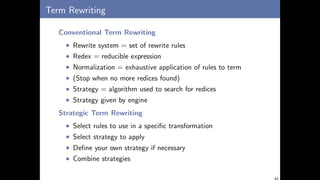
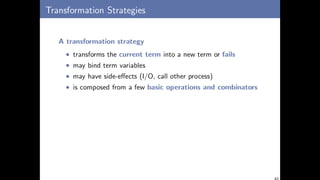
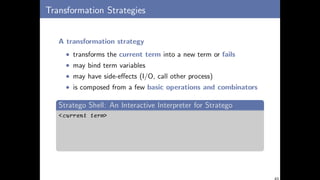
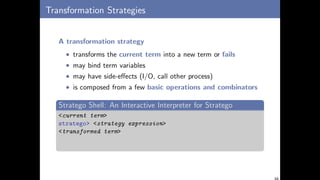
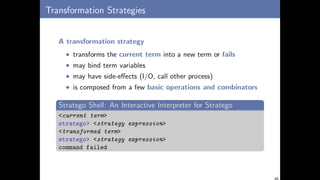

![Parsing: From Text to Terms
!21
Let(
[ FunDec(
"fact"
, [FArg("n", Tp(Tid("int")))]
, Tp(Tid("int"))
, If(
Lt(Var("n"), Int("1"))
, Int("1")
, Seq(
[ Times(
Var("n")
, Call(
Var("fact")
, [Minus(Var("n"), Int("1"))]
)
)
]
)
)
)
]
, [Call(Var("fact"), [Int("10")])]
)
let function fact(n : int) : int =
if n < 1 then 1 else (n * fact(n - 1))
in fact(10)
end](https://image.slidesharecdn.com/cs4200-2019-5-transformation-190926112142/85/CS4200-2019-Lecture-5-Transformation-by-Term-Rewriting-21-320.jpg)
![Syntax of Terms
!22
module Terms
sorts Cons Term
lexical syntax
Cons = [a-zA-Z][a-zA-Z0-9]*
context-free syntax
Term.App = <<Cons>(<{Term ","}*>)>
Zero()
Succ(Zero())
Cons(A(), Cons(B(), Nil()))](https://image.slidesharecdn.com/cs4200-2019-5-transformation-190926112142/85/CS4200-2019-Lecture-5-Transformation-by-Term-Rewriting-22-320.jpg)
![Syntax of Terms
!23
module Terms
sorts Cons Term
lexical syntax
Cons = [a-zA-Z][a-zA-Z0-9]*
context-free syntax
Term.App = <<Cons>(<{Term ","}*>)>
Term.List = <[<{Term ","}*>]>
Term.Tuple = <(<{Term ","}*>)>
Zero()
Succ(Zero())
[A(), B()]](https://image.slidesharecdn.com/cs4200-2019-5-transformation-190926112142/85/CS4200-2019-Lecture-5-Transformation-by-Term-Rewriting-23-320.jpg)
![module ATerms
sorts Cons Term
lexical syntax
Cons = [a-zA-Z][a-zA-Z0-9]*
Cons = String
Int = [0-9]+
String = """ StringChar* """
StringChar = ~["n]
StringChar = "" ["]
context-free syntax
Term.Str = <<String>>
Term.Int = <<Int>>
Term.App = <<Cons>(<{Term ","}*>)>
Term.List = <[<{Term ","}*>]>
Term.Tuple = <(<{Term ","}*>)>
Syntax of Terms
!24
0
1
[A(), B()]
Var(“x”)
Let(
[ Decl(“x”, IntT()),
Decl(“y”, BoolT())
]
, Eq(Var(“x”), Int(0))
)](https://image.slidesharecdn.com/cs4200-2019-5-transformation-190926112142/85/CS4200-2019-Lecture-5-Transformation-by-Term-Rewriting-24-320.jpg)
![Syntax of A(nnotated) Terms
!25
module ATerms
sorts Cons Term
lexical syntax
Cons = [a-zA-Z][a-zA-Z0-9]*
// more lexical syntax omitted
context-free syntax
Term.Anno = <<PreTerm>{<{Term “,"}*>}>
Term = <<PreTerm>>
PreTerm.Str = <<String>>
PreTerm.Int = <<Int>>
PreTerm.App = <<Cons>(<{Term ","}*>)>
PreTerm.List = <[<{Term ","}*>]>
PreTerm.Tuple = <(<{Term ","}*>)>
Var(“x”){Type(IntT())}](https://image.slidesharecdn.com/cs4200-2019-5-transformation-190926112142/85/CS4200-2019-Lecture-5-Transformation-by-Term-Rewriting-25-320.jpg)

![Signatures
!27
context-free syntax
Exp.Uminus = [- [Exp]]
Exp.Power = [[Exp] ** [Exp]]
Exp.Times = [[Exp] * [Exp]]
Exp.Divide = [[Exp] / [Exp]]
Exp.Plus = [[Exp] + [Exp]]
Exp.Minus = [[Exp] - [Exp]]
Exp.CPlus = [[Exp] +i [Exp]]
Exp.CMinus = [[Exp] -i [Exp]]
Exp.Eq = [[Exp] = [Exp]]
Exp.Neq = [[Exp] <> [Exp]]
Exp.Gt = [[Exp] > [Exp]]
Exp.Lt = [[Exp] < [Exp]]
Exp.Geq = [[Exp] >= [Exp]]
Exp.Leq = [[Exp] <= [Exp]]
Exp.True = <true>
Exp.False = <false>
Exp.And = [[Exp] & [Exp]]
Exp.Or = [[Exp] | [Exp]]
Signature declares argument and
return types of term constructors
Signature is automatically generated
from SDF3 productions
Stratego compiler only checks arity
of constructor applications
signature
constructors
Uminus : Exp -> Exp
Power : Exp * Exp -> Exp
Times : Exp * Exp -> Exp
Divide : Exp * Exp -> Exp
Plus : Exp * Exp -> Exp
Minus : Exp * Exp -> Exp
CPlus : Exp * Exp -> Exp
CMinus : Exp * Exp -> Exp
Eq : Exp * Exp -> Exp
Neq : Exp * Exp -> Exp
Gt : Exp * Exp -> Exp
Lt : Exp * Exp -> Exp
Geq : Exp * Exp -> Exp
Leq : Exp * Exp -> Exp
True : Exp
False : Exp
And : Exp * Exp -> Exp
Or : Exp * Exp -> Exp](https://image.slidesharecdn.com/cs4200-2019-5-transformation-190926112142/85/CS4200-2019-Lecture-5-Transformation-by-Term-Rewriting-27-320.jpg)
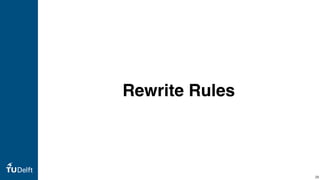
![Desugaring
!29
desugar: IfThen(e1, e2) -> IfThenElse(e1, e2, NoVal())
if x then
printint(x)
else
()
IfThen(
Var("x")
, Call(
"printint"
, [Var("x")]
)
)
IfThenElse(
Var("x")
, Call(
"printint"
, [Var("x")]
)
, NoVal()
)
pattern matching pattern instantiation
e1
e2
if x then
printint(x)](https://image.slidesharecdn.com/cs4200-2019-5-transformation-190926112142/85/CS4200-2019-Lecture-5-Transformation-by-Term-Rewriting-29-320.jpg)
![Lists of ElseIfs
!30
If(c, e1, [
ElseIf(c2, e2),
ElseIf(c3, e3),
…
])
signature
constructors
If : Exp * Exp * List(ElseIf) -> Exp
ElseIf : Exp * Exp -> ElseIf
IfThen : Exp * Exp * Exp -> Exp
Desugar :
If(c, e, []) -> IfThen(c, e, NoVal())
Desugar :
If(c, e, [ElseIf(c2, e2) | es]) -> IfThen(c, e, If(c2, e2, es))](https://image.slidesharecdn.com/cs4200-2019-5-transformation-190926112142/85/CS4200-2019-Lecture-5-Transformation-by-Term-Rewriting-30-320.jpg)
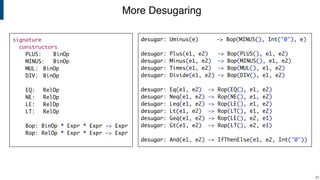
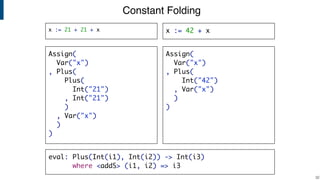
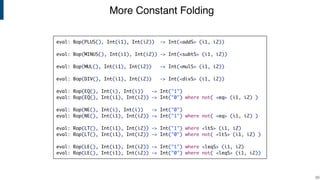
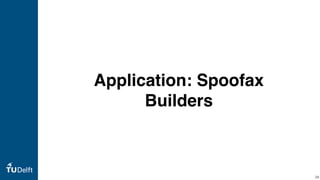
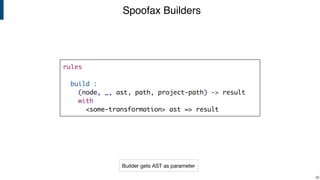
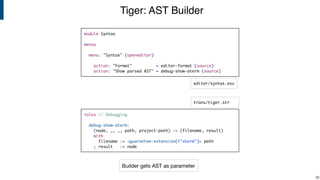
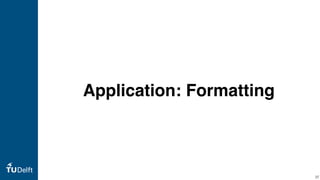
![Tiger: Formatting Builder
!38
module Syntax
menus
menu: "Syntax" (openeditor)
action: "Format" = editor-format (source)
action: "Show parsed AST" = debug-show-aterm (source)
rules
editor-format:
(node, _, ast, path, project-path) -> (filename, result)
with
ext := <get-extension> path
; filename := <guarantee-extension(|$[pp.[ext]])> path
; result := <pp-debug> node
editor/syntax.esv
trans/pp.str
rules
pp-Tiger-string =
parenthesize-Tiger
; prettyprint-Tiger-start-symbols
; !V([], <id>)
; box2text-string(|120)
pp-debug :
ast -> result
with
result := <pp-Tiger-string> ast
<+ …
; result := “"
trans/pp.str](https://image.slidesharecdn.com/cs4200-2019-5-transformation-190926112142/85/CS4200-2019-Lecture-5-Transformation-by-Term-Rewriting-38-320.jpg)
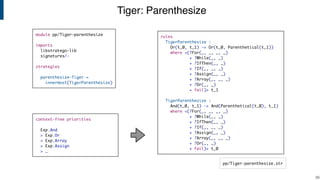
![Tiger: Pretty-Print Rules
!40
rules
prettyprint-Tiger-Exp :
If(t1__, t2__, t3__) -> [ H(
[SOpt(HS(), "0")]
, [ S("if ")
, t1__'
, S(" then")
]
)
, t2__'
, H(
[SOpt(HS(), "0")]
, [S("else")]
)
, t3__'
]
with t1__' := <pp-one-Z(prettyprint-Tiger-Exp)
<+ pp-one-Z(prettyprint-completion-aux)> t1__
with t2__' := <pp-indent(|"2")> [
<pp-one-Z(prettyprint-Tiger-Exp)
<+ pp-one-Z(prettyprint-completion-aux)> t2__ ]
with t3__' := <pp-indent(|"2")> [
<pp-one-Z(prettyprint-Tiger-Exp)
<+ pp-one-Z(prettyprint-completion-aux)> t3__ ]
context-free syntax
Exp.If = <
if <Exp> then
<Exp>
else
<Exp>
>
syntax/Control-Flow.sdf3
pp/Control-Flow-pp.str](https://image.slidesharecdn.com/cs4200-2019-5-transformation-190926112142/85/CS4200-2019-Lecture-5-Transformation-by-Term-Rewriting-40-320.jpg)
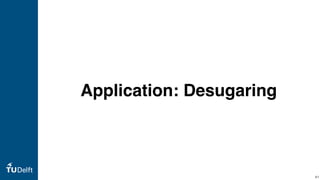
![Tiger: Desugaring
!42
function printboard() = (
for i := 0 to N-1 do (
for j := 0 to N-1 do
print(if col[i]=j then " O" else " .");
print("n")
);
print("n")
)
function printboard() = (
let
var i : int := 0
in
while i < N - 1 do ( (
let
var j : int := 0
in
while j < N - 1 do (
print(if col[i] = j then
" O"
else
" .");
j := j + 1
)
end;
print("n")
);
i := i + 1
)
end;
print("n")
)
Expressing for in terms of while++](https://image.slidesharecdn.com/cs4200-2019-5-transformation-190926112142/85/CS4200-2019-Lecture-5-Transformation-by-Term-Rewriting-42-320.jpg)
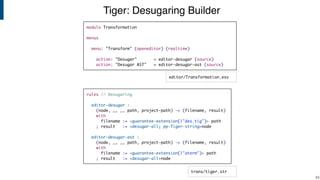
![Tiger: Desugaring Transformation
!44
module desugar
imports signatures/Tiger-sig
imports …
strategies
desugar-all = topdown(try(desugar))
rules
desugar :
For(
Var(i)
, e1
, e2
, e_body
) ->
Let(
[VarDec(i, Tid("int"), e1)]
, [ While(
Lt(Var(i), e2)
, Seq(
[ e_body
, Assign(Var(i), Plus(Var(i), Int("1")))
]
)
)
]
)](https://image.slidesharecdn.com/cs4200-2019-5-transformation-190926112142/85/CS4200-2019-Lecture-5-Transformation-by-Term-Rewriting-44-320.jpg)

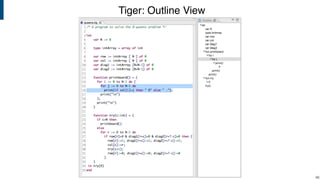
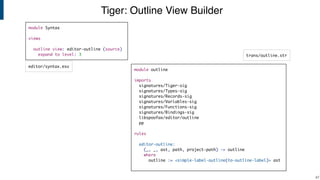
![Tiger: Outline View Rules
!48
rules
to-outline-label :
Let(_, _) -> $[let]
to-outline-label :
TypeDec(name, _) -> $[type [name]]
to-outline-label :
FunDec(name, _, t, _) -> $[fun [name] : [<pp-tiger-type> t]]
to-outline-label :
ProcDec(name, _, _) -> $[fun [name]]
to-outline-label :
VarDecNoType(name, _) -> $[var [name]]
to-outline-label :
VarDec(name, _, _) -> $[var [name]]
trans/outline.str
rules
to-outline-label :
Call(f, _) -> $[[f]()]
to-outline-label :
If(_, _, _) -> $[if]
to-outline-label :
For(Var(name), _, _, _) -> $[for [name]]
// etc.](https://image.slidesharecdn.com/cs4200-2019-5-transformation-190926112142/85/CS4200-2019-Lecture-5-Transformation-by-Term-Rewriting-48-320.jpg)
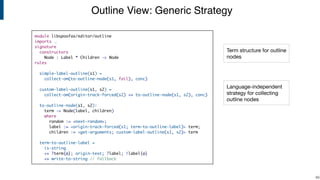

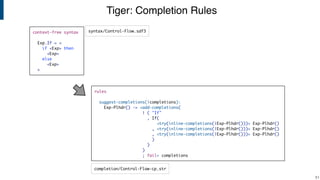
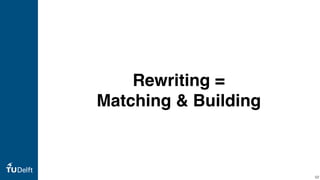
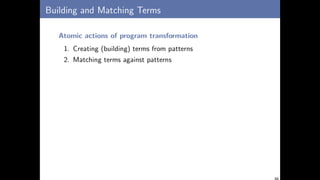
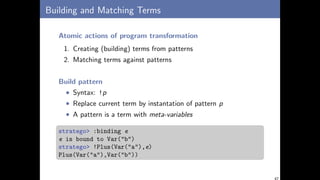
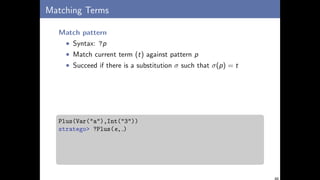
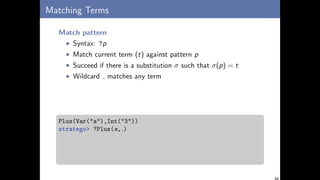
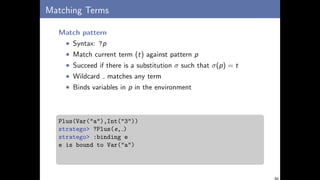
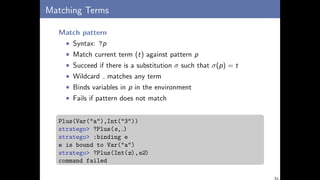
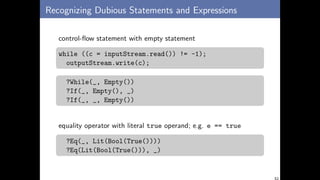
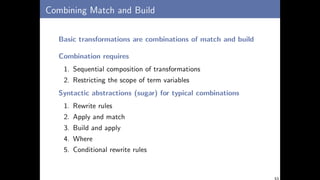
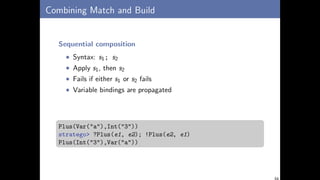
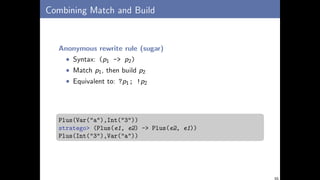
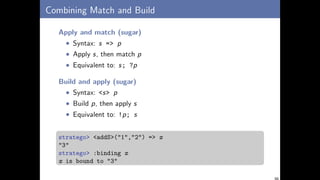
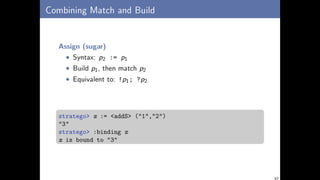
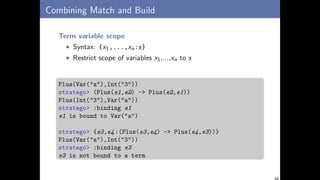
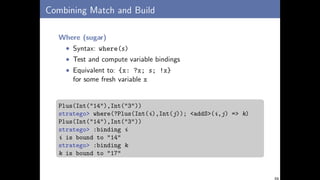
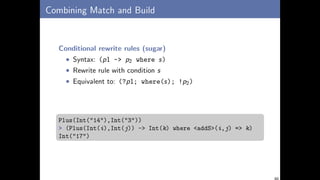
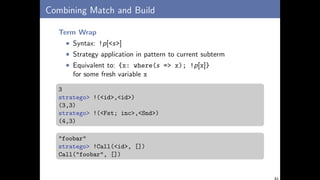
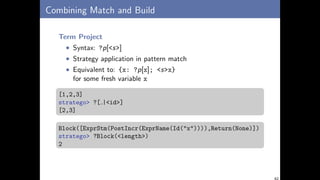
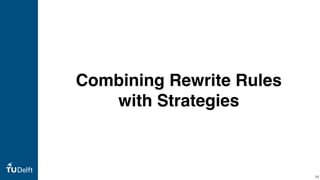
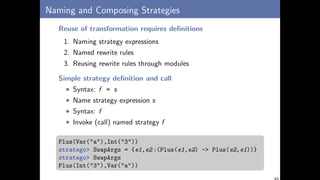
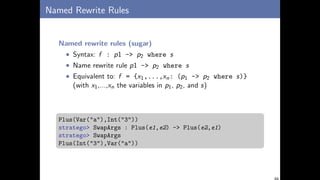
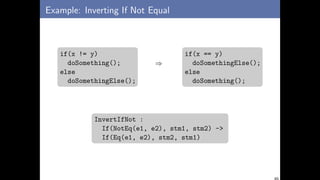
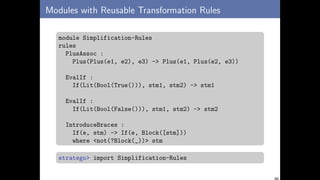
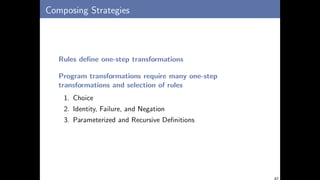
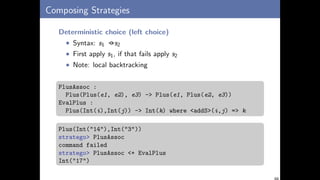
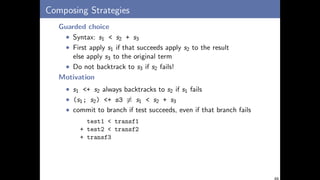
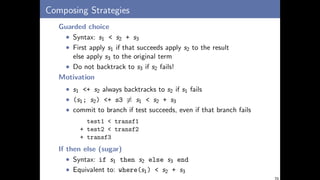
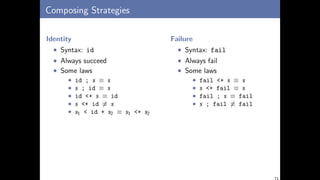
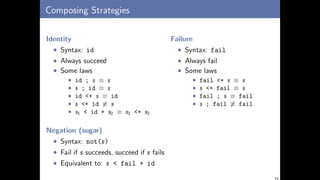
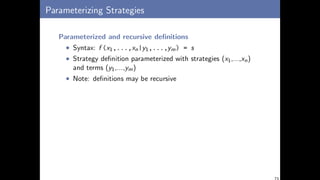
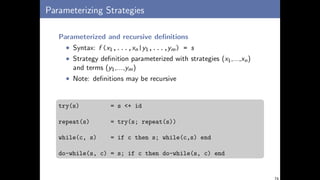
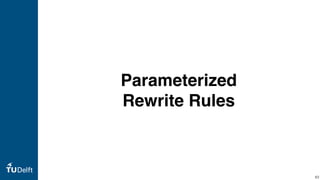
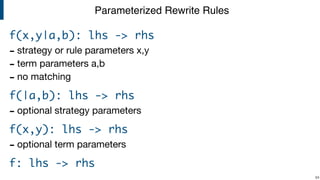
![Parameterized Rewrite Rules: Map
!85
[ 1
, 2
, 3
]
[ 2
, 3
, 4
]
map(inc)
inc
1
2
3
2
3
4inc
inc
map(s): [] -> []
map(s): [x|xs] -> [<s> x | <map(s)> xs]](https://image.slidesharecdn.com/cs4200-2019-5-transformation-190926112142/85/CS4200-2019-Lecture-5-Transformation-by-Term-Rewriting-85-320.jpg)
![Parameterized Rewrite Rules: Zip
!86
[ 1
, 2
, 3
]
[ (1,4)
, (2,5)
, (3,6)
]
[ 4
, 5
, 6
]
zip
[ 1
, 2
, 3
]
[ 5
, 7
, 9
]
[ 4
, 5
, 6
]
zip(add)
map(add)
zip(s): ([],[]) -> []
zip(s): ([x|xs],[y|ys]) -> [<s> (x,y) | <zip(s)> (xs,ys)]
zip = zip(id)](https://image.slidesharecdn.com/cs4200-2019-5-transformation-190926112142/85/CS4200-2019-Lecture-5-Transformation-by-Term-Rewriting-86-320.jpg)
![Parameterized Rewrite Rules: Fold
!87
[1,2,3] foldr(!0,add) 6
[]
0
[3]
3
[2,3]
56
[1,2,3]
foldr(s1,s2): [] -> <s1>
foldr(s1,s2): [x|xs] -> <s2> (x,<foldr(s1,s2)> xs)](https://image.slidesharecdn.com/cs4200-2019-5-transformation-190926112142/85/CS4200-2019-Lecture-5-Transformation-by-Term-Rewriting-87-320.jpg)
![Parameterized Rewrite Rules: Inverse
!88
[1,2,3] inverse(|[]) [3,2,1]
[2,3]
[1][]
[1,2,3] [3]
[2,1] [3,2,1]
[]
inverse(|is): [] -> is
inverse(|is): [x|xs] -> <inverse(|[x|is])> xs](https://image.slidesharecdn.com/cs4200-2019-5-transformation-190926112142/85/CS4200-2019-Lecture-5-Transformation-by-Term-Rewriting-88-320.jpg)

